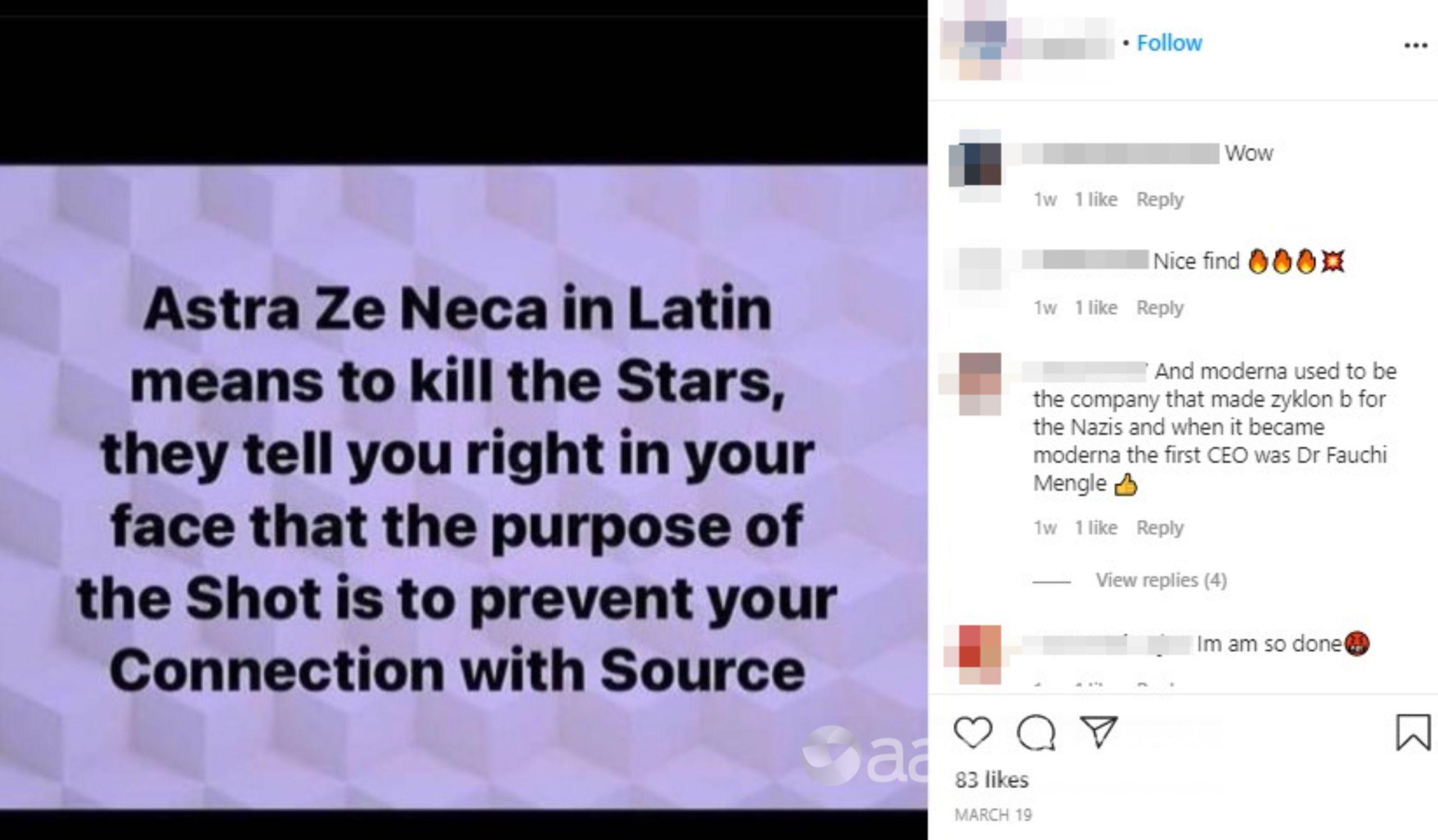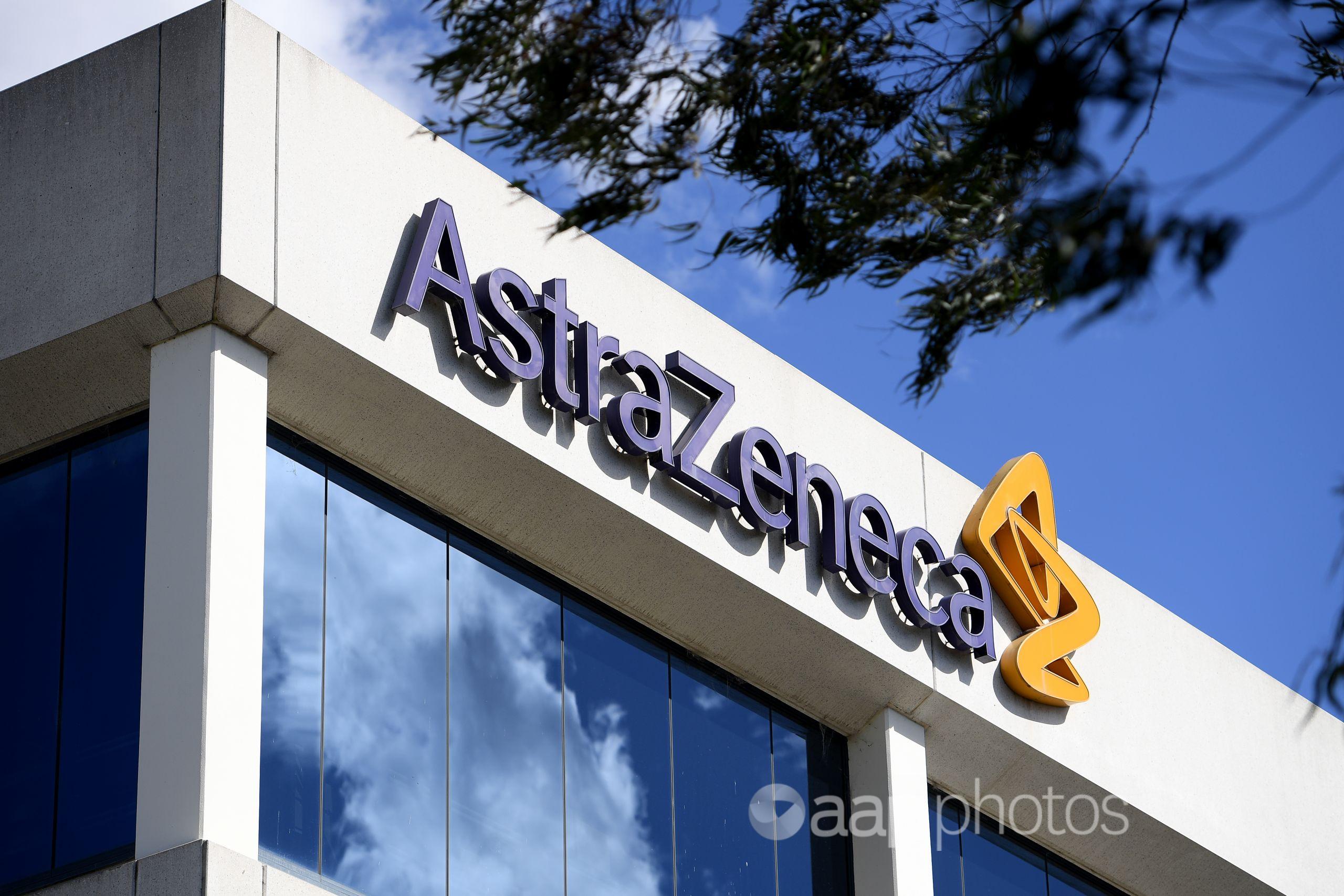The Statement
An Instagram post claims the Latin meaning of AstraZeneca is to “kill the stars” before implying a sinister motive behind the rollout of the pharmaceutical giant’s COVID-19 vaccines.
The March 19 post from an Australia-based account includes a meme that reads: “Astra Ze Neca in Latin means to kill the Stars, they tell you right in your face that the purpose of the Shot is to prevent your Connection with Source.”
The same meme has been shared to a Dutch Facebook page, while a similar meme claiming AstraZeneca is composed of words originating in Sanskrit, Polish and Latin that mean “weapon that kills” have generated thousands of shares (see examples here, here, here and here).

The Analysis
AstraZeneca‘s name may bear a literal resemblance to the Latin featured in the meme, but the true origins of the brand owe as much to marketing as the classical language.
The company is one of several to have produced successful COVID-19 vaccines, partnering with Oxford University to develop and distribute the university’s candidate.
The meme claiming that AstraZeneca means “weapon that kills” has already been widely debunked (here, here and here) on the basis that it randomly chooses definitions from different languages using a selective methodology for translation.
To investigate the suggestion that the name means “kill the stars” in Latin, AAP FactCheck queried its translation with Latin expert Robert Griffiths, head of languages at St Cuthbert’s College in Auckland. Mr Griffiths said the claims made in the post were partially correct.
“Neca in Latin means ‘kill’ as an imperative, or order,” he said via email.
“Astra does indeed mean ‘stars’ and, in these forms, the two words could indeed mean ‘kill the stars’ – whatever that actually means? But it is grammatically correct.”
However, he noted that the word “ze” did not exist in Latin, adding that he did not support the post’s “bizarre claims”.
In a Twitter thread from October 2019, before the novel coronavirus became known, AstraZeneca explained the more benign origins behind its name – which was cemented in a 1999 merger between Astra AB and Zeneca Group.
The company tweeted that Astra AB had been founded in 1913 in Södertälje, Sweden, and that “Astra” had its roots in the Greek astron, meaning “star”.
In a history of Astra AB, published in January 2002, Swedish pharmaceuticals journal Läkemedelsvärlden tracked the company’s origin back to news of its formation, although it said the name was taken from Latin not the similar word in Greek.
The UK-based Zeneca was formed in 1993 with the demerger of the pharmaceuticals and agrochemicals businesses of Imperial Chemical Industries.
In its Twitter thread, AstraZeneca said the name “Zeneca” was created by an agency instructed to find a name beginning with a letter from either the start or the end of the alphabet. The name was to be short, memorable and with no offensive meaning in any language.
The former CEO of Zeneca, Sir David Barnes, earlier provided a similar story about the origins of the company’s name, telling the UK’s The Daily Telegraph in 2001:
“There is an advantage in being alphabetically at the top or bottom of lists, A or Z. I asked Interbrand to find a name that was phonetically memorable, of no more than three syllables and didn’t mean anything stupid, funny or rude in other languages. A new name also allowed us to instil a new company culture.”
The Verdict
It is correct that components of the name AstraZeneca mean “kill the stars” in Latin, however the post fails to account for the presence of “ze” – which has no meaning in the language.
The literal translation is also contradicted by the company’s own explanations of its name’s origins, which easily predates the COVID-19 pandemic.
Partly False – Content that has some factual inaccuracies.
* AAP FactCheck is an accredited member of the International Fact-Checking Network. To keep up with our latest fact checks, follow us on Facebook and Twitter.
All information, text and images included on the AAP Websites is for personal use only and may not be re-written, copied, re-sold or re-distributed, framed, linked, shared onto social media or otherwise used whether for compensation of any kind or not, unless you have the prior written permission of AAP. For more information, please refer to our standard terms and conditions.


















